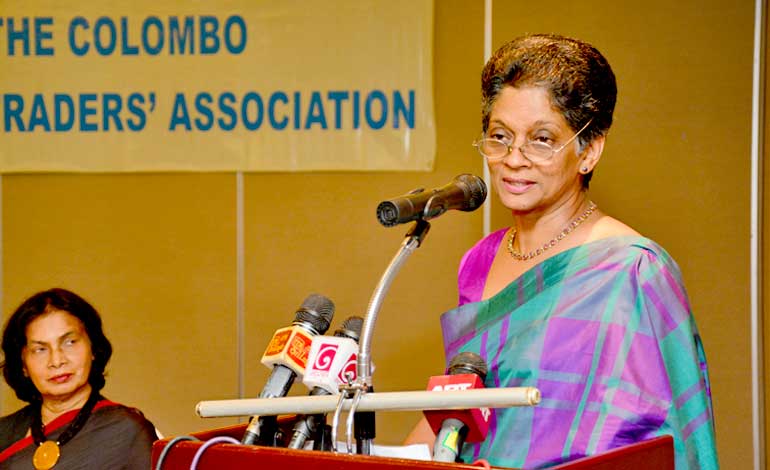Thursday Feb 19, 2026
Thursday Feb 19, 2026
Tuesday, 2 August 2016 00:08 - - {{hitsCtrl.values.hits}}
By Charumini de Silva
Joining the private sector’s call for policy consistency, the state-run Export Development Board (EDB) head Indira Malwatta last week took up the call criticising the Government for failing to establish a stable business environment and pointing out that it would affect the economy beyond exports.
Sudden policy inconsistencies are greatly affecting efforts to achieve an ambitious export target of $ 30 billion by 2020, the senior official said on Friday while addressing the 97th AGM of the Colombo Rubber Traders Association. She told the gathering that continuous policy changes were greatly distressing to the export community.
 EDB Chairperson Indira Malwatte – Pic by Krishan Ranasinghe
EDB Chairperson Indira Malwatte – Pic by Krishan Ranasinghe
“Inconsistency of policy is something that doesn’t help the export community at all. This doesn’t mean only exports but in all things the Government should have one voice for policy,” she stressed.
According to Malwatte, the exports which contributed 40% to GDP have now come down drastically to 14.5% of the GDP.
She said that after lobbying for several months on the regulation imposed by the Government on 90-day earnings repatriation, the EDB has finally been successful in pushing it to 150 days.
“I am happy to say that the Government agreed to extend export revenue repatriation to 150 days from 1 August. I know that 150 days might not be the best but we were able to lobby it to the Government,” she added.
Malwatte also emphasised that before long the EDB would remove key para-tariffs, which would allow the private sector to operate under minimum procedures.
“We at EDB keep pressing to allow the private sector to operate, give them the freedom to operate and take off all these extra procedures. In fact some of the para-tariffs like PAL and NBT are something that we are moving and I am sure before long all these para-tariffs will be removed,” she explained.
While expressing her confidence that Sri Lanka should be the polymer hub of this part of the world, Malwatte insisted that the rubber industry should develop it to the level of the apparel sector of a ‘total solution’ destination.
“It is important that the industries continue because you cannot say that world prices have gone too high and we cannot purchase. We have to purchase raw materials at competitive prices and on the other hand we have to improve our productivity so we make the maximum amount of rubber that we have,” she added.